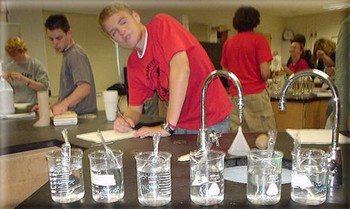Easy Worksheet on Control in an Experiment
Scientific Method
Most science classes, including biology, start with an introductory lesson on the nature of science. The scientific method is an integral part of all science classes. Students should be encouraged to problem-solve and not just perform step by step experiments.
Stories and Scenarios
Lab Safety – illustration, identify good and bad procedures
Lab Safety Guidelines – contract for students to sign that lists basic rules for the lab
Controls and Variables – read experiment scenarios, identify controls
Scientific Method in Action – reading passage shows how the scientific method was used to solve real world problems (beriberi and penicillin discovery)
 Manipulated and Responding Variables – science fair project stories, identify key parts of the experiment
Manipulated and Responding Variables – science fair project stories, identify key parts of the experiment
The Elephant Poem – contemplate the nature of observations
The Martian and the Car – identify what makes something "alive"
The Language of Science – prefixes and suffixes
Debunking the Paranormal – investigate a "claim" from a scientific standpoint, critical thinking skills
How Many Hands on a Horse – article with questions about measuring horses and the importance of standard units
Scientific Method Scenarios – take a question and design an experiment to test the question, each group receives a different question and shares their design with the class
Scientific Method and Causal Questions – examine a flow chart on variables that affect water evaporation
Significant Figures – An activity that looks at uncertainty in measurements, comparing rulers with different values.
Hands-On Activities
Scientific Method Experiments – a collection of short inquiry labs the focus on consumer science. Students design and test their hypotheses
Investigation: What Are the Processes of Science – students design an experiment about lung capacity; requires spirometers, AP Biology
Sponge Capsules – quick lab using capsules and water (toys) to collect data on how fast the "animals" grow
Sponge Animals: Growing Insects – this lab grows sponge animals, graphs and calculates the growth rate (slope of line)
Plop Plop Fiz Fiz – measure the rate of dissolving in alka-seltzer tablets in both hot and cold water (a basic experiment for introducing the scientific method)
Water in Living Things – investigate how much water is stored in grass clippings
Gummi Bear Experiment – inquiry lab investigating the dissolving properties of gummi bears
Mystery Eggs – students use the scientific method to guess how many nails are hidden inside plastic eggs
Saving Sam – using paperclips rescue Sam, the gummy worm by putting a life preserver on him
Observation – opener lab, using the senses to investigate hardware items, then describe items
Pendulum Project – Inquiry based, experimental design and data analysis (physical science)
Penny Lab – conduct an experiment on surface tension, water drops are added to a penny and compared with soapy water
Carbon Dioxide Production – determine how activity changes the amount of CO2 expelled
Making Slime – instructions for creating a polymer
Measuring Lung Capacity – graphing and data gathering
Measure a Bean – basic lab where students work with volume and mass, as well as common lab equipment
Scientific Processes – Tools and Measurements – work with graduated cylinders and other tools to practice measuring (metric system)
What is the Effect of Exercise on Heart Rate – aligned to NGSS, feedback mechanisms and homeostasis. Students design and conduct an experiment.
Investigation: What Factors Effect the Heart Rate of Daphnia – expose a tiny crustacean to ethanol and gather data on its heart rate
Virtual Labs
Using the Scientific Method – Plant Experiment – change variable such as soil type and addition of soap
Can Crickets Tell the Temperature? – change the temperature and count the number of chirps
Virtual Lab – Independent and Dependent Variables
List of Virtual Labs by Glencoe – some of these are inquiry labs where you can manipulate variables
Analyzing and Graphing Data
Analyzing Data – make and interpret graphs, summarize data trends
Graphing Data – Flow Rates – graph the flow rate of liquids in a pipe, simple plot and draw two lines
Graphing Practice – given data sets, such as video games scores and shirt colors, students create line and bar graphs, activity paired with growing sponge animals while students wait on results
Interpreting Graphs and English Usage – simple graph showing tadpoles, this is more of a vocabulary lesson on words used to interpret graphs, such as fluctuate, decline, stabilize…
Interpreting Graphs – shows a pie chart with grades, a scatter plot, and a few line graphs with questions to answer about each.
Data Collection is Fun(gi) – use notes gathered in a field journal to create a data table to organize information about fungi and graph the relationship between fruiting body size and number.
Microscope Use
How to Use a Microscope – basic guidelines, tips and troubleshooting for the classroom light microscope | Presentation
Microscope Labeling – image, no labels
Microscope Coloring – learn the parts of the microscope by coloring
Microscope "E" Lab – use a microscope to examine the letter "e"
Microscope "E" Lab – online version, for students who miss the lab in class
Microscope Virtual Lab – uses an online virtual microscope, students can actually focus and adjust light using the simulator
Microscope Lab (advanced) – for AP Biology
Lab Reports
![]() Lab Report Template & Rubric
Lab Report Template & Rubric
Scientific Method Flowchart– this flow chart can be used for any experimental design. Students organize their experiment, identify the controls and variables, collect data and draw conclusions.
Guides, Notes, and Information
Notes on the Scientific Method – a guide for understanding the processes of science
Lecture Powerpoints (you do not need to download to view)
Source: https://www.biologycorner.com/lesson-plans/scientific-method/
0 Response to "Easy Worksheet on Control in an Experiment"
Post a Comment